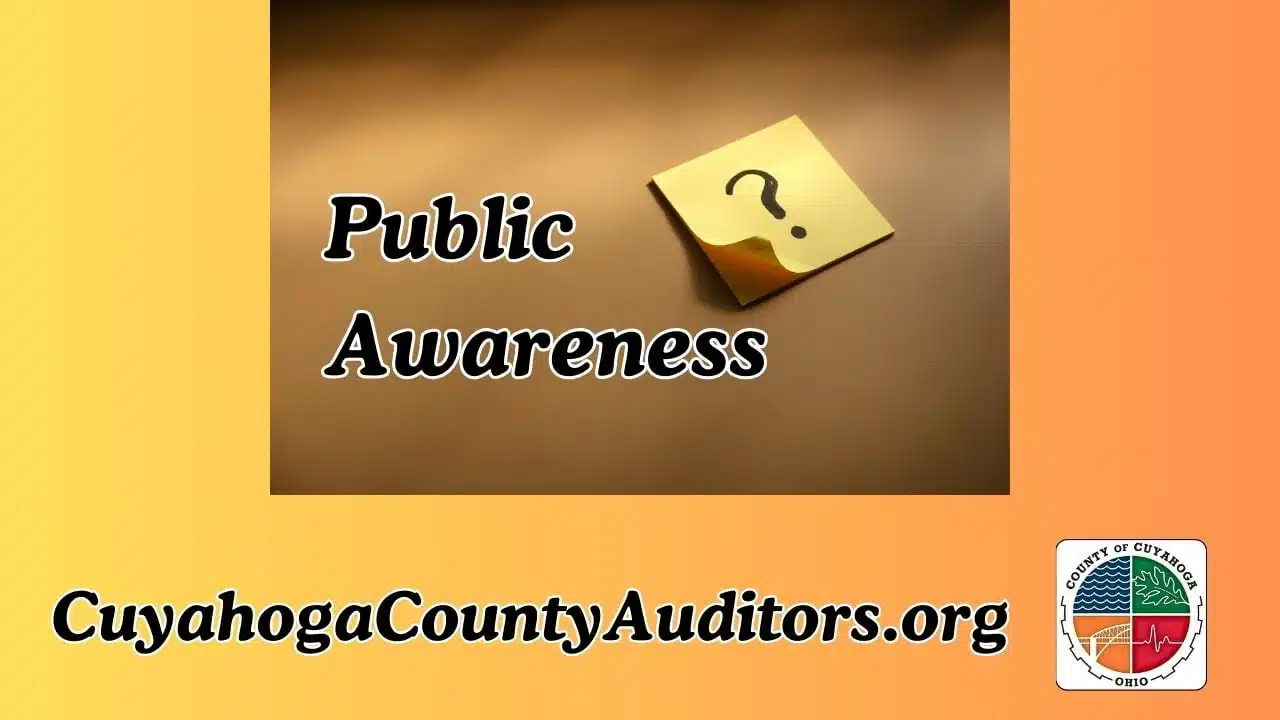The Cuyahoga County Auditor’s Office is key in managing public funds and ensuring local government transparency. The office focuses on improving public services, financial accountability, and fair property tax assessments.
This article will cover the Cuyahoga County Auditor’s programs, their goals, achievements, and impact on residents.
What are the Cuyahoga County Auditor’s Key Initiatives?
The Cuyahoga County Auditor’s main goals include improving fiscal responsibility, property valuation, public access, and community engagement. These efforts aim to meet community needs by using technology, increasing transparency, and boosting efficiency.
Key programs include property tax assessments, financial transparency portals, and community outreach to inform residents about taxes and county finances.
1. Property Valuation and Reappraisal Programs
The Cuyahoga County Auditor manages property assessments. The office conducts regular reappraisals and valuations of properties to ensure fair taxation. These assessments are vital for determining property taxes and ensuring owners pay their fair share based on market conditions.
- Triennial Updates: Every three years, the Cuyahoga County Auditor conducts a countywide reappraisal to adjust property values. This ensures the tax base reflects the current real estate market.
- Fair Market Value Assessments: The auditor’s office uses advanced valuation methods to determine the fair market value of properties. These valuations are based on recent sales data and other relevant market information.
Importance of Accurate Property Valuations:
Accurate property valuations ensure property taxes are fairly distributed. It prevents overtaxing, which can harm homeowners and reduce housing affordability in the county.
2. Financial Transparency and Accountability
The Cuyahoga County Auditor’s office promotes transparency in managing public funds. A key initiative is the creation of financial transparency portals. These portals allow residents to track government spending and understand how taxpayer dollars are allocated.
- OpenGov Portal: This online platform gives residents real-time access to the county’s financial data. It lets users view budget allocations, revenue sources, and expenditures.
- Annual Financial Reports: The auditor’s office publishes detailed reports each year. These reports outline the county’s financial status, including revenues, expenditures, and debt obligations. They are accessible to the public for transparency.
Benefits of Financial Transparency:
- Public Trust: Transparency builds trust between the government and its citizens. It ensures public officials are accountable for financial decisions.
- Informed Decisions: Financial data access allows residents to make informed decisions. They can voice concerns about spending priorities and fiscal management.
3. Property Tax Relief Programs
Cuyahoga County offers tax relief programs to help homeowners reduce their property tax burden. These programs are vital for low-income residents, senior citizens, and veterans who may struggle with rising property taxes.
- Homestead Exemption: The Homestead Exemption program allows qualifying seniors, disabled homeowners, and veterans to reduce their taxable property value. This results in lower property taxes, helping elderly and disabled residents on fixed incomes.
- Tax Reduction for Low-Income Families: Special programs assist low-income families who may be unable to afford their property taxes. The auditor’s office works with local nonprofits and social services to provide tax relief for these vulnerable populations.
Eligibility Requirements for Property Tax Relief:
To qualify for these programs, residents must meet certain income or age thresholds. The auditor’s office provides online resources and support to help residents apply for these benefits.
4. GIS and Property Mapping Services
The Cuyahoga County Auditor’s Office has a Geographic Information System (GIS). It shows an interactive map of all properties in the county. This tool lets people see detailed info about properties, like zoning and property values.
- Interactive Property Maps: Users can search for property info by address or owner name. The maps show lot sizes, tax data, and property improvements.
- Public Use: The platform is open to everyone. It’s great for people wanting to know about properties and businesses looking to invest.
Benefits of GIS Mapping:
- Ease of Access: People can get property data online, saving them a trip to the auditor’s office.
- Planning and Development: The GIS helps businesses and developers make smart choices in Cuyahoga County.
5. Community Outreach and Education Programs
The Cuyahoga County Auditor is active in community outreach. These programs aim to teach people about property assessments and tax relief. They also explain the auditor’s role in managing public funds.
- Public Workshops: Workshops are held to explain property assessments and tax relief programs. They help homeowners understand their property tax bills.
- Online Resources: The auditor’s office has a big online library. It covers property tax laws and tax relief programs.
- Collaboration with Local Schools: The auditor’s office works with schools. They teach students about local government and property taxes.
| Program Name | Target Population | Benefit Provided | Application Process |
|---|---|---|---|
| Homestead Exemption | Seniors (65+), Disabled | Reduced taxable property value | Online or in-person application |
| Veterans Exemption | Military Veterans, Disabled | Lower property tax rates | Requires proof of military status |
| Low-Income Tax Credit | Low-Income Households | Tax credit for eligible families | Financial assessment required |
6. Audit and Compliance Programs
The Cuyahoga County Auditor’s office does internal audits. They check county departments for compliance with laws. These audits find ways to improve county operations.
- Internal Audits: The office audits county departments regularly. They look for financial compliance and waste or fraud.
- Audit Findings: Audit reports are public. This lets residents see how their government is doing and if changes are needed.
Importance of Auditing:
Auditing helps make government more accountable. It finds ways to save taxpayer money and use public resources wisely.
7. Business and Economic Development Initiatives
The Cuyahoga County Auditor’s office does more than handle property taxes. It also helps local businesses grow through economic development programs. These efforts aim to bring in new investments, create jobs, and boost the county’s economy.
- Enterprise Zone Tax Incentives: The office gives tax breaks to businesses in certain areas. This helps them save money and grow, creating more jobs.
- Commercial Property Valuation Assistance: Businesses need accurate property values for planning. The auditor’s office helps ensure fair assessments and tax rates for them.
| Business Type | Tax Incentive | Eligibility Criteria | Length of Incentive |
|---|---|---|---|
| Manufacturing Firms | 50% tax abatement | New or expanding businesses | Up to 10 years |
| Retail Businesses | 25% tax reduction | Located within designated zones | 5 years |
| Technology Startups | 75% tax credit | Investment in local infrastructure | 7 years |
8. Technology and Digital Transformation
The Cuyahoga County Auditor’s office is using new technology to improve services. This digital shift has made things faster and easier for everyone. Now, people can get the information they need online without waiting.
- Online Tax Payments: You can now pay your property taxes online. It’s safer and more convenient.
- Digital Document Access: You can look up tax records and property deeds online. No need to visit the office.
- Mobile-Friendly Website: The website works well on phones and tablets. This makes it easy to check property info anytime, anywhere.
Benefits of Digital Transformation:
- Efficiency: Online services mean faster processing and less waiting for everyone.
- Convenience: You can access important info from anywhere, at any time. No need to visit offices.
Conclusion
The Cuyahoga County Auditor’s office works hard to be accountable and fair. It uses technology, offers tax breaks, and engages with the community. This helps manage public funds well and meets the needs of residents and businesses.
These efforts show the auditor’s commitment to transparency and fairness. They help ensure property taxes are fair and local government is accountable. This supports the growth and success of the community.
As the county grows, the Auditor’s office remains key in managing finances and supporting economic development. It plays a vital role in the region’s success.






